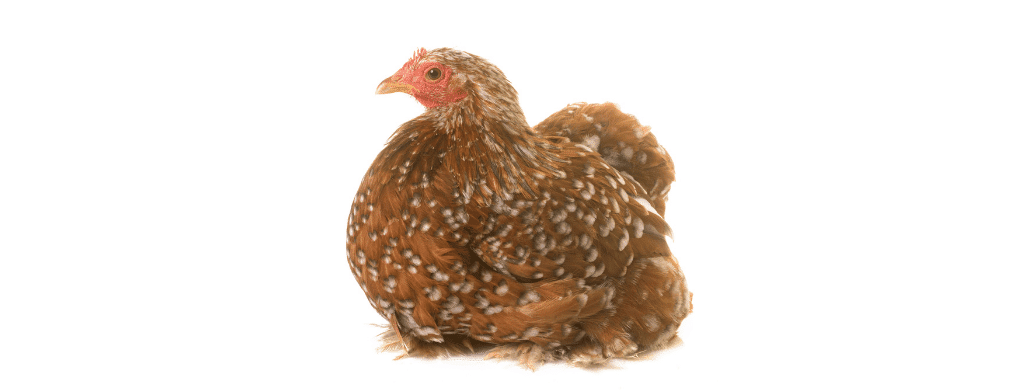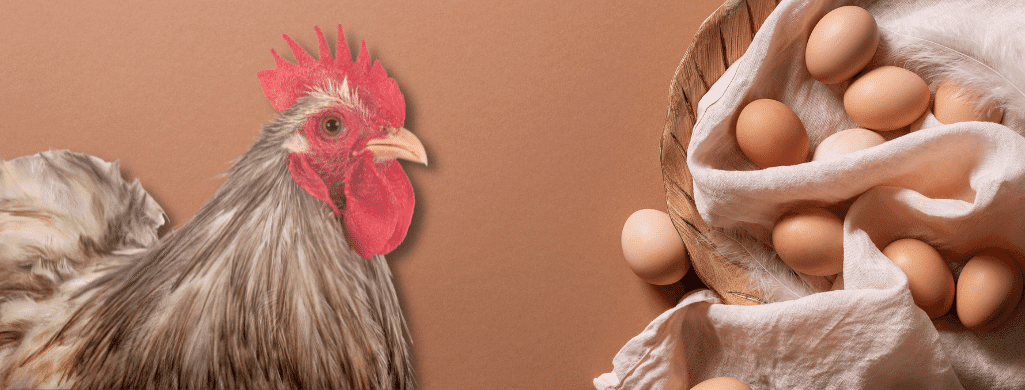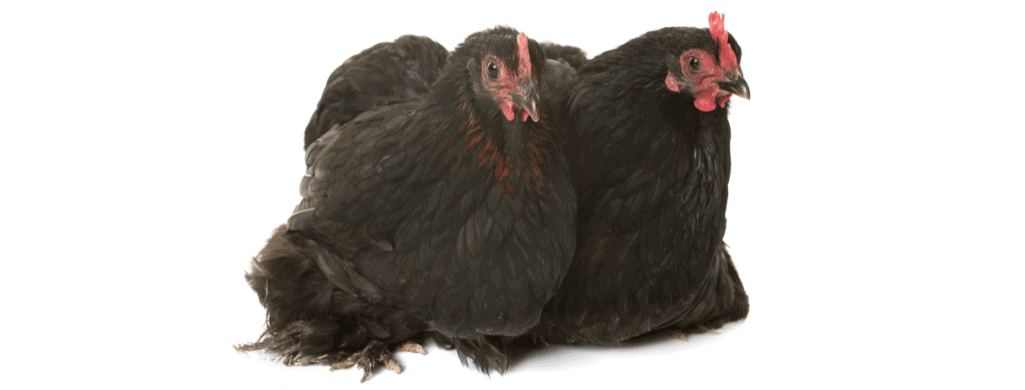Pekin chickens are a true bantam breed with conflicting origin stories.
They’re gentle birds with all different colored feathers.
But they aren’t the earliest or most dependable layers.
So, when do Pekin chickens start laying eggs for you?
Pekin hens begin laying between 6-8 months of age. But like many other chicken breeds, their egg production starts much later if they come of age in fall or winter. Despite their thick foot feathering, Pekins are not so cold hardy as to lay in the colder months.
Read ahead for more details on Pekin chickens and their delicious eggs!

Table of Contents
ToggleWhat Age Do Pekin Chickens Come Into Lay?
Their baby feathers are gone, and your docile birds are starting to look less like chicks and more mature. You know it’s only a matter of time before the first egg appears when you see this.
With Pekins, this will likely happen at the 6-8 month mark.
However, some backyard chicken keepers report their Pekin hens laying as early as 4 months of age!
This is impressive, especially for a breed of chicken that is not known their egg production.
Remember, a bird who reaches the magic age in October or later will probably wait until Spring to lay her first egg.
The winter months are tough on all your baby chicks, egg layers, and pullets.
When Do Pekin Chickens Go Broody?
If your pullet hits laying age right before winter, she may go broody before laying her first egg.
Pekin hens are notoriously broody.
They only lay an average of two eggs per week because they are so often broody!
This is a huge asset for you if you like natural incubation over artificial incubation.
But if you are looking for chicken breeds with amazing egg production or even meat production, Pekins aren’t for you.
Some chicken keepers report their hens going broody just a couple of weeks after starting to lay.
If your chickens only lay 2 or even 1 day per week and take constant breaks due to broodiness… Needless to say, you aren’t getting a lot of eggs from them.
A misconception says Pekin hens are not gentle birds; they are. This misunderstanding is likely a result of their broodiness trait.
Pekins are sweet with chicken handlers, other chickens, ducks, and everyone else they meet.
When you force them off a clutch of eggs, they may be annoyed with you. But they are otherwise such gentle layers!
Because they’re so broody, Pekin chickens need adequate space in their nesting boxes to sit for a long time.
But then they do not spend as much time foraging and running around, so they don’t need much space outside the coop.

Can Pekins Hatch Eggs?
Your Pekin hens will gladly hatch eggs for you when they’re in one of their broody moods.
This happens frequently with this breed, which means you’re in luck!
The eggs do not need to be from a Pekin hen and certainly not from the broody Pekin hen.
Simply give your Pekin the eggs you want to hatch, and she’ll provide natural incubation.
It is important only to do this when your hen is already broody!
What happens if you give fertilized eggs to a chicken who goes broody a lot but is not currently broody?
She won’t take good care of the eggs. She will get up and forage or take a dirt bath.
A bird who isn’t broody won’t suddenly go broody when you give her a couple of eggs. Work with her natural instincts, not against them.
When you get your broody hen set up with a clutch of eggs, give her access to water and food right where she is.
Offering her a drinking water source and food at her nesting box will allow her to stay sat on those eggs.
You don’t want your hen to be getting up constantly. Again, you have to work with her, not against her.
What Color Are Pekin Chicken Eggs?
Pekins are not one of the few chicken breeds with a unique egg color. Their eggs are a very light brown color and small.
Contrary to some belief, different varieties of the Pekin breed do not lay different colored eggs.
For example, a Pekin with white feathers will lay the same brown egg as a Pekin with colored feathers.
Their eggs are not the most exciting thing about this bird.
But remember what the Pekin chicken has to offer!
Aesthetically, their foot feathering and beautiful body feathers make them more interesting.
Pekin roosters have elaborate tail feathers as well.
Furthermore, Pekins are extremely docile birds.
Even the roosters are gentle by nature, though they become territorial sometimes.
Other common chicken breeds and their egg colors:
| Chicken Breed | Egg Color – Size |
|---|---|
| Pekin | Light brown – small |
| Cream Legbar Chicken | Light blue – medium/large |
| Rhode Island Red | Brown – large/extra large |
| Polish Chicken | White – medium |
| Plymouth Rock | Brown – large |
| Cochin | Brown – medium/large |
| Welsummer | Dark reddish brown – large |

Raising Pekin Chickens
No worries if these pros are not enough for you and you want better laying hens!
But if Pekin bantams just stole your heat, let us help! Here’s what you need to know before you purchase any:
- Not cold hardy
- Extremely small
- Extra feather care
Pekin chickens are not very cold-hardy despite their extra layer of feathers.
Not only do they stop laying in the winter, but they have a hard time keeping their body temperature up.
Unless your coop is well-heated during the cold weather months, it isn’t the best idea to raise Pekins in a cold climate.
Pekins are true bantam chickens, which means they are positively tiny.
On average, they are less than 30cm tall and weigh less than 1.5 pounds.
Don’t expose them to bullying by putting them in a coop with an angry 10-pound rooster!
Finally, Pekins require some extra TLC for their fluffy plumage.
Do frequent mite checks and consider giving them the occasional trim.
Pekins 101
Pekin chickens usually start laying late, at around 6-8 months of age.
They are not dependable layers due to their 2-egg-per-week standard and excessive broodiness.
These birds do not lay in the winter nor take the cold well.
Being true bantam chickens, they are also incredibly small.
Make sure to take proper care of their adorable plumage and take advantage of their status as excellent mothers!
How useful was this post?
Click on a star to rate it!
We are sorry that this post was not useful for you!
Let us improve this post!
Tell us how we can improve this post?
